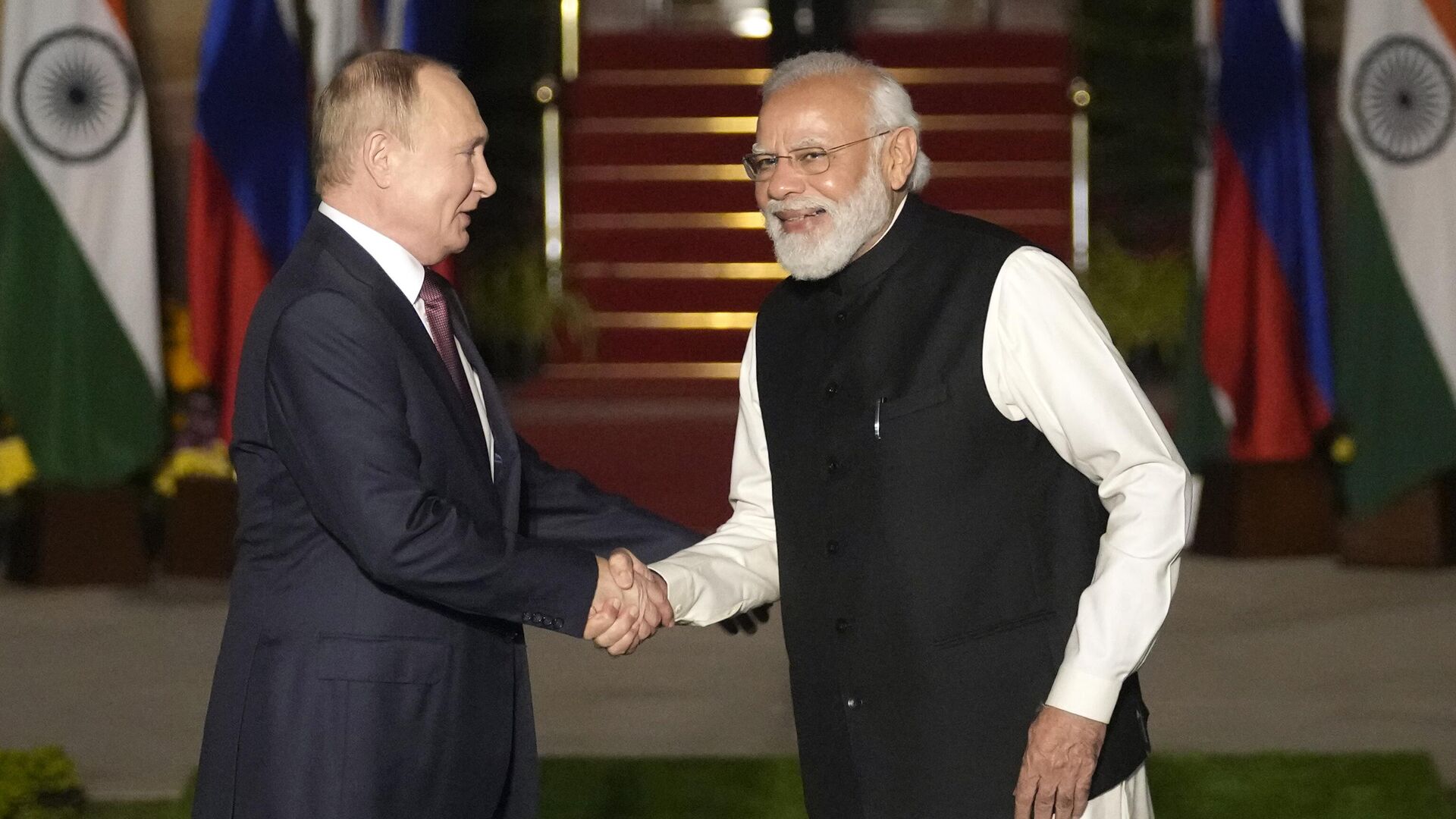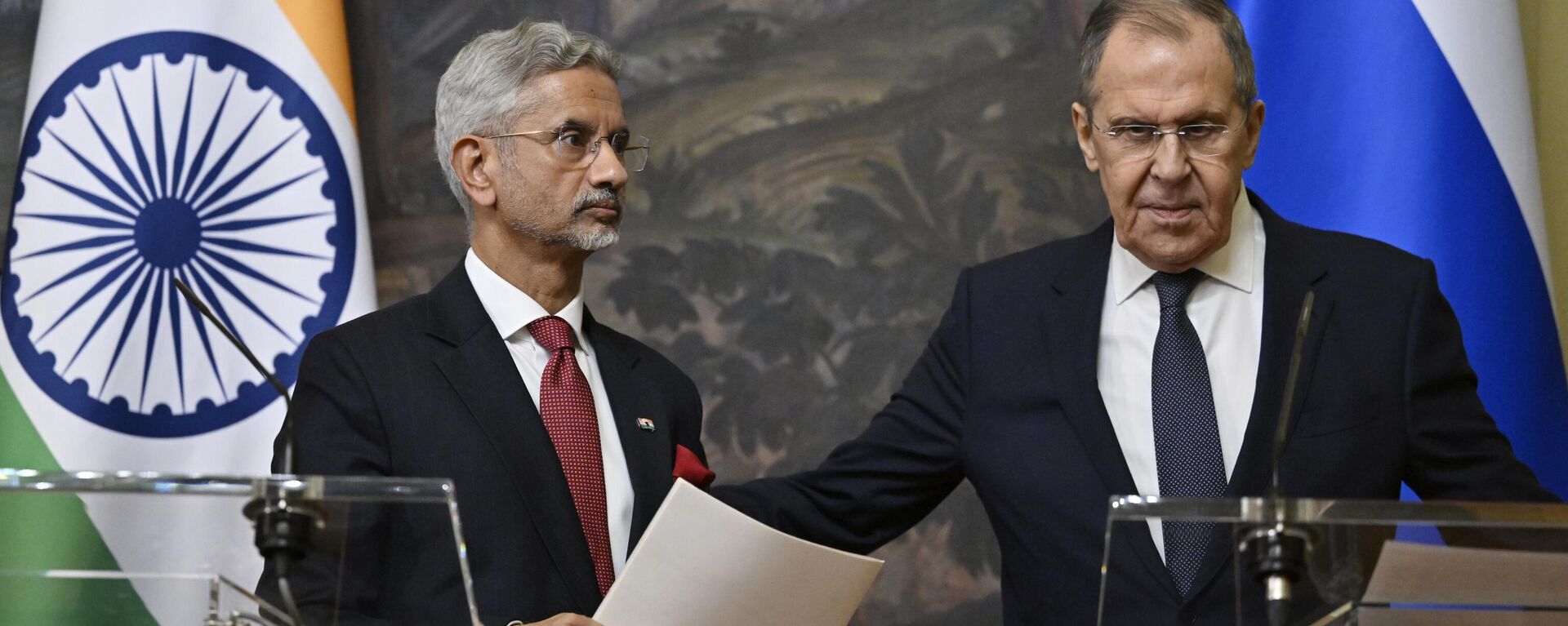https://sputniknews.in/20240527/indian-academics-face-backlash-for-west-inspired-scaremongering-on-russia-china-ties-7458062.html
Indian Academics Face Backlash for West-Inspired Scaremongering on Russia-China Ties
Indian Academics Face Backlash for West-Inspired Scaremongering on Russia-China Ties
Sputnik India
Former top foreign policy bureaucrat Kanwal Sibal has come down heavily on two Indian experts for suggesting that an expanding China-Russia relationship could affect ties between New Delhi and Moscow in the long-run.
2024-05-27T16:17+0530
2024-05-27T16:17+0530
2024-05-29T12:28+0530
indo-russian relations
nato
taliban
ministry of external affairs (mea)
russia
india
china
s. jaishankar
narendra modi
boris johnson
https://cdn1.img.sputniknews.in/img/07e8/03/15/6901710_0:160:3072:1888_1920x0_80_0_0_6040f7e426af1e049fc82549a1e78b2e.jpg
Former top foreign policy bureaucrat Kanwal Sibal has come down heavily on two experts for suggesting that an expanding China-Russia relationship could affect ties between New Delhi and Moscow in the long-run.In her column titled "India can’t ignore Russia-China bonhomie. Pursue CNP with a grand strategy", Rao argued that Moscow and Beijing were bound together by their "fundamental disregard for international law and the United Nations Charter".Pointing towards the four-year long Sino-India border dispute, the author opined that Russia was doing the same to its neighbours as China was doing to India."Russia would never do that to India, but it is doing that to its neighbours. And for continuing to do so, it needs China", rather than it's South Asian partner, she wrote. Rao believes, that it may sound discomforting, but "that is how the cunning of history is unfolding".The criticism of Rao's statement was backed by several social media users, some of who questioned the author for writing "blatant stuff against India's allies".Ex-diplomat also got into a social media exchange with Professor Sreeram Chaulia, the dean of Jindal School of International Affairs (JSIA), after he came to the athour's defence.He further questioned Chaulia over his other views that "handing over Afghanistan (by the US) to the Taliban* was in India's national interest" and that "building-up China" by the West over the years had helped New Delhi. The ex-foreign secretary said that Indian foreign policy should not be made by "befuddled fellows" in the government who have no idea of the state's interest.In another social media post in reaction to Chaulia's comment, he underlined that it was futile for India to turn its back on an "old friend" Russia which has never harmed the state's interests."Diplomacy is also based on elementary common sense. There will be those who will like to cosy up to the new friend for some benefit they can get and be willing to vilify the old friend. We have examples before us. Dinosaurs have been replaced by mammals. Amongst them are also pet dogs, who wag their tails for potential treats and weasels too," the former diplomat concluded his argument.Despite the western sanctions against Moscow due to the Ukraine conflict, India and Russia are expanding the scope of bilateral relationship beyond traditional realms of defence to focus more on the trade, which hit a record of $65 billion in 2023-24.Accroding to Prime Minister Narendra Modi, New Delhi's decision to source Russian oil in spite of western pressure was taken in the interest of Indian consumer.Analysts have forecast that Moscow would continue to remain a top supplier of crude to New Delhi, which seeks to become the world's third biggest economy by 2029, in coming months.*under UN sanctions
https://sputniknews.in/20240515/jaishankar-explains-russias-important-role-in-indias-viksit-bharat-goal-7368474.html
russia
india
china
ladakh
galwan valley
us
europe
eurasia
Sputnik India
feedback.hindi@sputniknews.com
+74956456601
MIA „Rossiya Segodnya“
2024
Sputnik India
feedback.hindi@sputniknews.com
+74956456601
MIA „Rossiya Segodnya“
News
en_IN
Sputnik India
feedback.hindi@sputniknews.com
+74956456601
MIA „Rossiya Segodnya“
Sputnik India
feedback.hindi@sputniknews.com
+74956456601
MIA „Rossiya Segodnya“
putin news, putin xi meeting, putin xi summit, russia ukraine war, russia news, russia ukraine, modi news, russia india trade, russia india china, india china relations, india china border, india china war, india china news, brics summit, brics dedollarisation, us sanctions, us sanctions chabahar
putin news, putin xi meeting, putin xi summit, russia ukraine war, russia news, russia ukraine, modi news, russia india trade, russia india china, india china relations, india china border, india china war, india china news, brics summit, brics dedollarisation, us sanctions, us sanctions chabahar
Indian Academics Face Backlash for West-Inspired Scaremongering on Russia-China Ties
16:17 27.05.2024 (Updated: 12:28 29.05.2024) India’s former foreign secretary Kanwal Sibal has shot down west-backed narrative that growing Russia-China ties would harm India’s national interests.
Former top foreign policy bureaucrat Kanwal Sibal has come down heavily on two experts for suggesting that an expanding China-Russia relationship could affect ties between New Delhi and Moscow in the long-run.
Sibal, who's also served as an Ambassador to Moscow, accused the academics of parroting a "western line on Russia".
"Shallow understanding of Russia-West confrontation over Ukraine. Also, out of line with govt [the Indian government] views," he reacted on social media to an article by Swasti Rao, a senior fellow at Manohar Parrikar Institute for Defence Studies And Analyses (MP-IDSA).
In her column titled "India can’t ignore Russia-China bonhomie. Pursue CNP with a grand strategy", Rao argued that Moscow and Beijing were bound together by their "fundamental disregard for international law and the United Nations Charter".
Pointing towards the
four-year long Sino-India border dispute, the author opined that Russia was doing the same to its neighbours as China was doing to India.
"Russia would never do that to India, but it is doing that to its neighbours. And for continuing to do so, it needs China", rather than it's South Asian partner, she wrote. Rao believes, that it may sound discomforting, but "that is how the cunning of history is unfolding".
The criticism of Rao's statement was backed by several social media users, some of who questioned the author for writing "blatant stuff against India's allies".
Ex-diplomat also got into a social media exchange with Professor Sreeram Chaulia, the dean of Jindal School of International Affairs (JSIA), after he came to the athour's defence.
"You obviously see Russia’s collapse as being in India’s national interest. You seem to think along with your like minded scholar from IDSA that NATO's expansion was strategically innocent, no power other than Russia has breached international law or the UN Charter, invaded other countries, or has had imperial ambitions (British ex-PM Johnson has said recently that if Russia won in Ukraine, it will mean the end of western hegemony)," Sibal told the academic.
He further questioned Chaulia over his other views that "handing over Afghanistan (by the US) to the Taliban* was in India's national interest" and that "building-up China" by the West over the years had helped New Delhi.
The ex-foreign secretary said that Indian foreign policy should not be made by "befuddled fellows" in the government who have no idea of the state's interest.
"Our government, in your thinking, is seriously compromising our national interest by nurturing our ties with Russia politically and economically, with connectivity projects, more investments in oil sector, more trade, more access to Russia’s natural resources," Sibal stressed.
In another social media post in reaction to Chaulia's comment, he underlined that it was futile for India to turn its back on an "old friend" Russia which has never harmed the state's interests.
"Diplomacy is also based on elementary common sense. There will be those who will like to cosy up to the new friend for some benefit they can get and be willing to vilify the old friend. We have examples before us. Dinosaurs have been replaced by mammals. Amongst them are also pet dogs, who wag their tails for potential treats and weasels too," the former diplomat concluded his argument.
Despite the western sanctions against Moscow due to the Ukraine conflict, India and Russia are expanding the scope of bilateral relationship beyond traditional realms of defence to focus more on the trade, which hit a record of $65 billion in 2023-24.
Accroding to Prime Minister Narendra Modi, New Delhi's decision to source
Russian oil in spite of
western pressure was taken in the interest of Indian consumer.
Analysts have forecast that Moscow would continue to remain a top supplier of crude to New Delhi, which seeks to become the world's third biggest economy by 2029, in coming months.


